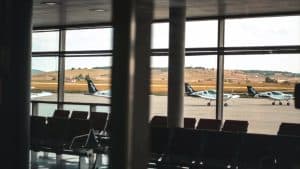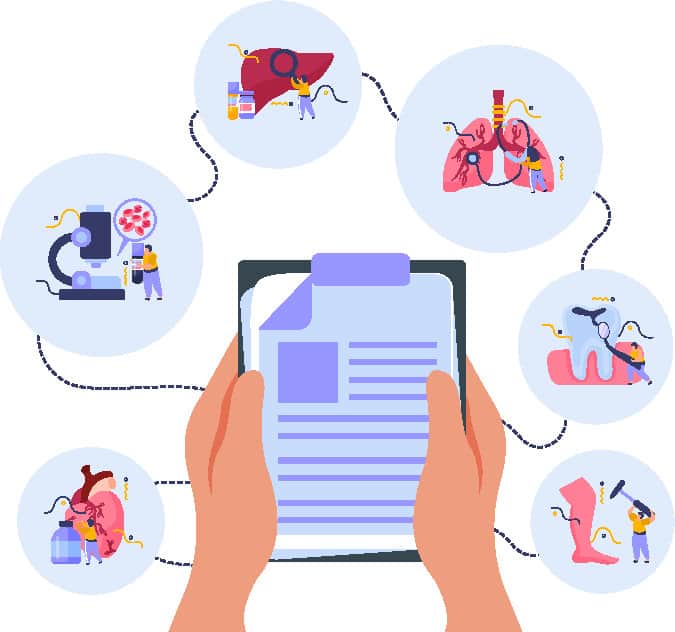As a professional pilot we are responsible for the lives of our passengers and safe operation of the flight. Not only do we need to be performing at the highest level, we also need to be healthy and medically fit to be at the controls. Therefore, a requirement to fly commercially is that pilots need to hold a Class 1 Medical. On this page we will discuss the Class 1 Medical, what the Class 1 Medical examination involves and how to get one. FlyBy students will be happy to know that we take care of the Class 1 medical for you and the cost is included in the price of the course. Our students will travel with their classmates to an Aeronautical Medical Examiner (AME) for this at the start of their training.
What Medical do I need?
There are two levels of medical that can be obtained in aviation (Note, there is another for Light Aircraft Pilots Licence too). The Class 1 Medical for commercial pilots and the Class 2 Medical for pilots flying for leisure. As you can imagine, the requirements are greater to pass the Class 1 Medical. As we train the next generation of professional pilots so they are ready to join the world’s leading airlines, all of our students must be able to obtain a Class 1 Medical.
How often do I need to renew your Class 1 Medical?
The validity of your medical depends on your age. Between the age of 18 and 60 the Class 1 Medical is valid for 1 year. After that, until the mandatory requirement age of 65, the medical must be renewed every 6 months.
Am I going to pass my Class 1 Medical?
The majority of students have no problems in passing their medical evaluation. You don’t need to be an Olympic athlete in order to become a pilot and the testing is fairly straightforward. Of course, there are occasions where a student fails a part of their medical. Your option to retake the medical will depend on the reason you failed the initial medical. Unfortunately there are some conditions which result in a person not being eligible to obtain the Class 1 Medical at all. Other, less severe issues can be rectified through medication and working with specialist doctors/consultants. Once they sign you off you can retake the medical and hopefully pass. If you have a medical issue that you are concerned about then you will need to contact an AME to give you advice. Someone who is not qualified cannot give you advice on this sort of thing. Some local doctors will be able to give you a good idea about how the issue will affect you if you tell them that you intend to become a professional pilot however they are not specialists in aeronautical medicine so only an AME will be able to give you the latest advice.
What will be checked during the Class 1 Medical?
The AME will give you a comprehensive health examination during your appointment. There will be multiple sections to the examination including psychological and physical checks. You will need to complete a paper or computer based questionnaire with your basic details and medical history. Also you will need to rate yourself on various characteristics and how you would react to certain situations for a psychological check. This check is looking for inconsistencies, liars, risk takers and other traits that pose a risk to aviation. It is vital that you complete these honestly. If there are any concerns, the AME will discuss these with you afterwards.
The AME or their assistant will take you through a series of health checks to ensure you are physically able to fly. They cover your heart, eyesight, hearing, general health and include a blood/urine sample. Make sure to listen to instructions from your flight school or AME prior to the day of your medical exam as they may require that you don’t eat anything beforehand.
Below we will go into more depth about each of the exams you are going to be completing.
General Health
You are required to fill in a detailed medical history form. It will ask about past illnesses or trips to the hospital, details of your family’s medical history and medication or allergies you have or have had in the past. It would be prudent to contact your normal doctor at home and request your medical records to take with you for the Class 1 medical. As part of a general check up, the AME will listen to your heart and lungs to check for any defects, take your blood pressure and also test your reflexes.
Hearing
An audiogram will be completed. For these you will be placed in a special soundproof box and (usually) given headphones to wear. You will complete the exercise one ear at a time. The doctor will play a sound at various pitches and you will need to press a button (or just say) when you can hear the sound. The purpose of this is to measure the range of hearing in your ears. It will show the degree, type and configuration of hearing loss.
A balance test will also take place. Balance is largely a function of the components of your inner ear. During this section you will need to perform various movements that the AME asks for. It will test your coordination. For example you might be asked to close your eyes, hold your arms out to the side and then touch your nose one hand at a time with your index finger.
Eyesight
You do not need to have perfect vision to be a pilot. Many people ask if they can still become a pilot if they wear glasses or contact lenses. The answer is yes, depending on the level of correction required. If you do wear glasses or have lenses, please note that you will need to carry a spare pair of glasses with you at all times when you are flying. For the most current limitations please see the following link: https://www.easa.europa.eu/downloads/70485/en (Subpart A – AMC1 MED.B.070 Visual system – (d))
For the eyesight section you will have to read a series of letters/numbers from a set distance. The doctor will ask you what the lowest line of the chart is that you can read. You will need to do this with one eye at a time as one eye may be worse than the other.
The AME will have a series of pictures or flash cards with a background colour and numbers or letters known as the Ishihara test. These are checking for colour blindness. There are restrictions on pilots who are colourblind.
You will need to be checked for blind spots also. This requires you to follow an item that the doctor is holding and let him or her know when the item enters or leaves your vision. Also, there will be a check of your eye health too with a special tool to check the back of your eyeball (retina) and also checking for signs of glaucoma and other issues that may affect your vision.
Urine
You will need to provide a urine sample during your medical exam. This is so it can be tested for blood and sugar that shouldn’t be present in your urine. Having these in your urine can be signs of diabetes, kidney disease and other illnesses. The sample will also be tested for drugs as they are obviously not allowed for professional pilots.
Heart
An ECG (Electrocardiogram) will be taken of your heart. For this you will have sensors (electrodes) placed on your skin. This machine will then tell the doctor about your heart’s rhythm and electrical activity. The AME will be looking to see if there is an irregular rhythm, or there are signs that your heart and cardiovascular system have problems.
Blood Sample
A sample of blood is taken in order to check cholesterol and also to check your haemoglobin levels. Blood can provide the AME with indicators of certain diseases and general health problems such as infections, genetic diseases and organ health.
Haemoglobin is the protein in the blood that carries Oxygen around your body to your cells. This is especially important in aviation. We fly at high altitudes where the pressure is lower. Aircraft like the Boeing 737 or Airbus A380 are able to pressurise the cabin of the aircraft to the equivalent of 7000ft. Even at this altitude the blood’s ability to carry oxygen is slightly diminished as the partial pressure is decreased (you’ll learn more about this during your ATPL studies). Here’s a free lesson – the percentage of Oxygen remains the same at 21% throughout the Earth’s atmosphere. It is the decrease in pressure that causes people issues at higher altitudes.
Licensing & Medical Authority
The medical exam needs to be completed under the same authority as the licensing authority. For us here at FlyBy we are authorised by EASA (European Union Aviation Safety Agency) which means the licence and medical you receive on your pilot training with us are EASA. The medical and your pilot licence are closely linked which is why they need to be with the same authority. If you are considering obtaining your medical licence before joining us in Spain then please be sure to find an Authorised Medical Examiner who can provide you with the EASA Class 1 otherwise it will not be valid for our course.
Not all of the sections of the exam need to be repeated each time you renew your medical. The AME will write the date of expiry or the medical and also when certain tests need to be repeated (ECG & Audiogram).
The initial medical is more expensive than the renewals depending on how many aspects of the Class 1 need to be tested. It’s also important to know that you must report any decreases in medical fitness which may occur. This includes things like requiring new medication, being hospitalised, changes in required corrective lenses, etc. If in doubt, tell your AME and they will be able to update your medical or suspend your medical depending on the situation.
Don’t worry too much about the tests, there are many professional pilots who are past their prime and still successfully obtain their Class 1 Medical each year. If you are not already aware of a medical condition and also not aware of medical issues in your recent family history then you should have nothing to worry about. If you have something you are concerned about then we advise you to contact an EASA authorised AME as they are the only ones who will be able to give you a definite answer. Here at FlyBy the initial Class 1 medical is included in the price of the course.
If you already hold an EASA Class 1 medical then we will reduce the initial fee accordingly. Please ensure you tell us during the enrolment process.
Further reading:
EASA Medical Requirements
h t t p s : // w w w . e a s a . e u r o p a . e u /s i t e s /d e f a u l t / fi l e s /d f u / E a s y _ A c c e s s _ R u l e s _ f o r _ M e d i c a l _ R e quirements.pdf
EASA Medical FAQ’s
https://www.easa.europa.eu/the-agency/faqs/medical



